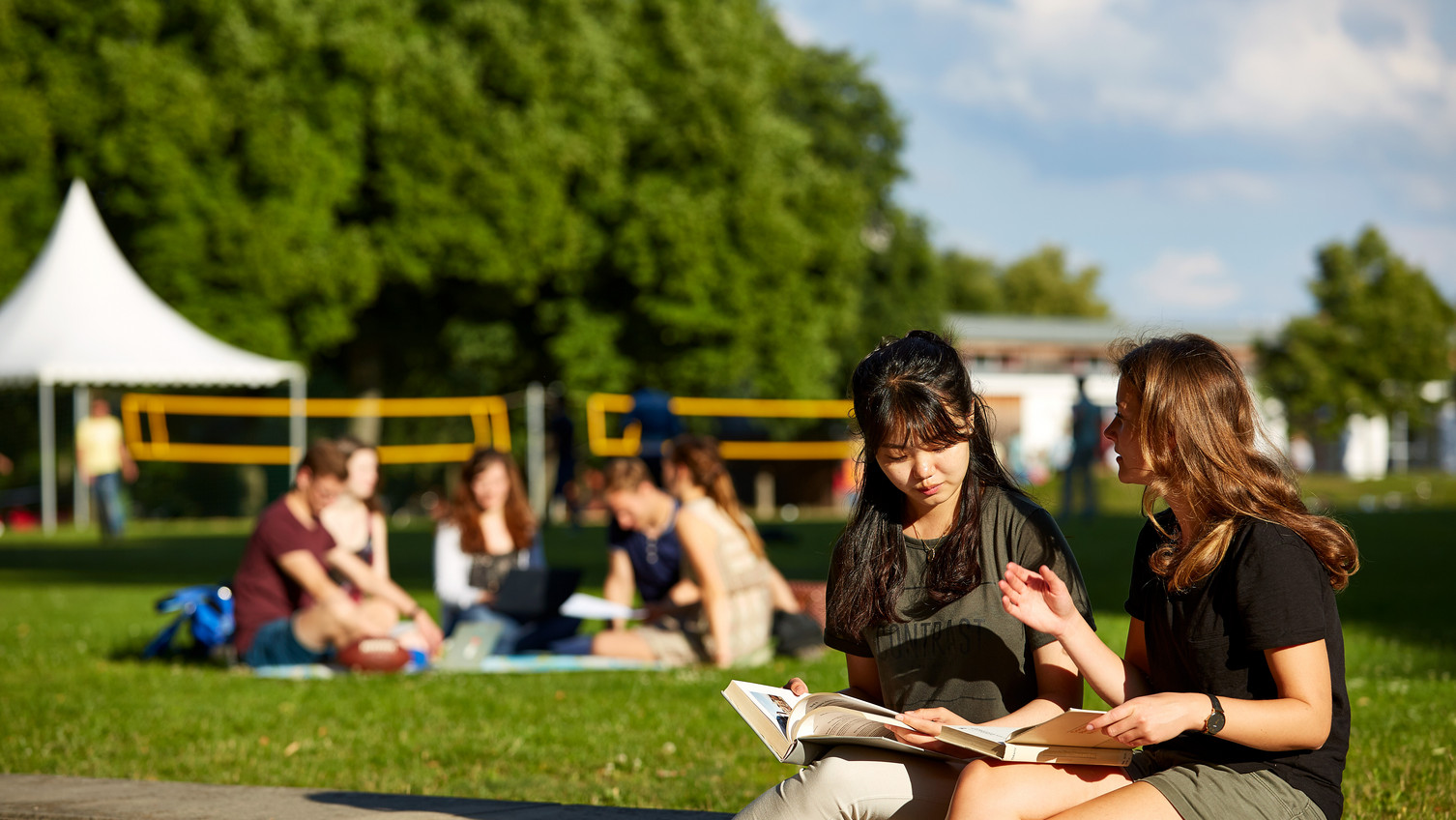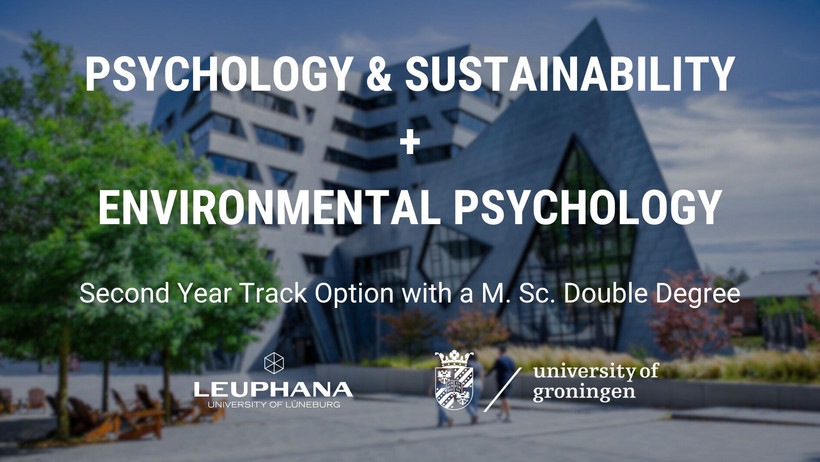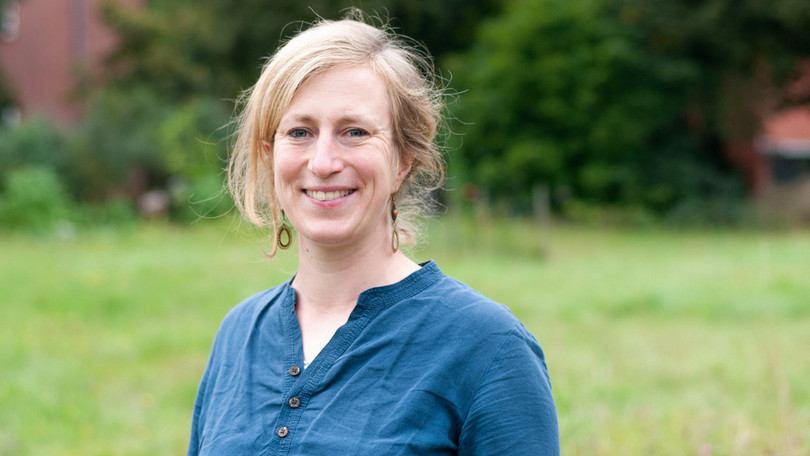Psychology & Sustainability
Sustainable Transformation - Human Behavior - Interdisciplinarity
As environmental and societal challenges intensify, the need for sustainable transformation has never been more urgent. Yet, transitioning towards sustainability involves more than technological solutions or policy reforms — it requires a deep understanding of human behaviour as a driver or barrier of this transition.
The Master’s programme in Psychology and Sustainability at Leuphana University is designed to empower you to explore the critical role of psychology in driving this change.
Through a mix of theory and practical application, you’ll learn to understand, predict, and influence behaviours that advance sustainability efforts.
Are you passionate about psychology and sustainability? This programme offers a unique opportunity to turn insight into impact.
Join us as we explore the human dynamics that will shape the future of our planet!
 ©Leuphana/Brinkhoff/Mögenburg
©Leuphana/Brinkhoff/Mögenburg
At a Glance
- Degree awarded: Master of Science (M.Sc.)
- Application deadline: EU degrees: 1 June / Non-EU degrees: 1 May
- Highlights: Unique interdisciplinary and multi-level approach to study psychological processes - enabling a thorough understanding of how individuals, communities and societies influence and are influenced by sustainable development; real-world testing of learned theories in transdisciplinary projects; option of a double degree with University of Groningen, option of combining Master’s and doctoral studies via the Doctoral Track
- Is aimed at: Graduates from psychology, social sciences, sustainability studies, or related fields who have earned at least 30 credits in psychology and are interested in psychological drivers and barriers in the transition to sustainability
- Type of programme: consecutive, academic prerequisites
- Start date: Every winter term, October
- Study places: 25
- Extent: 120 CP according to ECTS
- Duration: 4 semesters
- Language: English
- Location: Lüneburg
- Semester contribution: ca. 390 EUR
Psychology & Sustainability - The Programme
This programme is a two-year Master’s programme at Leuphana University, leading to a Master’s degree in Psychology & Sustainability. In your studies, you examine human behaviour and experience in the context of ecological, economic and social system transitions.
It uses a multi-level approach to study psychological processes at micro, meso and macro levels - enabling a thorough understanding of how individuals, communities and societies influence and are influenced by sustainable development.
Students will address questions such as:
- How do social norms influence sustainable behaviour?
- What motivates individuals to make environmentally responsible choices?
- How can psychological insights guide negotiation and collaboration on sustainable solutions?
Content
Sustainability science is an interdisciplinary field of research. Most disciplines in this field of research approach the topic of sustainability from a natural, social, or cultural science perspective with a focus on social-ecological systems.
Psychology, as the scientific discipline of human perception and behaviour investigates psychological processes at the level of individuals who are part of these social-ecological systems. Thus, psychology in the context of sustainability is concerned with cognitive (e.g., problem-solving), motivational (e.g., self-regulation), and emotional (e.g., fear) processes, the interplay between these processes, and how these psychological processes translate into behavioural drivers or barriers towards sustainable development.
The programme follows four guiding principles to establish an interdisciplinary exchange between psychology and sustainability science: The programme adopts a multi-level perspective, uses an interdisciplinary approach, focuses on problems and solutions, and adds a bottom-up (individual-to-system) approach to the well-established top-down (system-to-individual) perspective commonly pursued in the field of sustainability science.
By establishing this integrative approach to psychology in the context of sustainability, Leuphana University offers a unique Master’s programme in Europe and beyond, with the option of a double degree with the University of Groningen.
Students are invited to explore psychological drivers and barriers to sustainable development at different levels, such as intrapersonal (e.g. self-regulation), interpersonal (e.g. persuasion), intragroup (e.g. intragroup decision-making) or intergroup (e.g. intergroup negotiations). Both sustainability science and psychology are represented on the teaching staff and collaborate closely in inter- and transdisciplinary research projects.
The Master’s programme has a strong empirical research focus and thus provides students with practical knowledge on how to address the challenges of sustainable development from a psychological perspective within the broader framework of transdisciplinary research projects. To this end, students will acquire not only knowledge of psychology in the context of sustainability, but also methodological skills in planning, conducting, analysing and interpreting empirical research on one of the most pressing challenges of our time.
Here you can find further information on the course content of the Master's programme Psychology & Sustainability.
Structure
The Master’s programm in Psychology & Sustainability at Leuphana is designed as a two-year programme with the option to spend the second year at our partner institution, the University of Groningen.
The first semester at Leuphana University focuses on key principles of psychology in the context of sustainability at the individual, group, and societal levels. By introducing core theories and models, the programme links topics from the field of psychology with the field of sustainability science.
Accordingly, inter- and transdisciplinary work with a focus on theoretical propositions, methodological tools, and practical implications will characterise the programme in the second semester. Students have the opportunity to choose an elective course from one of the related psychology programmes at the Graduate School (Selected Topics in Psychology, e.g. International Human Resource Management). Thereby, the second semester aims to broaden students’ psychological perspective on the inter- and transdisciplinary characteristics of sustainability science.
In the second year of study, students sharpen their profile through further in-depth studies in sustainability science and psychology, with a distinct focus on a ‘Bottom-Up’ perspective. The second year at Leuphana not only strengthens the transdisciplinary focus through compulsory and elective courses from Sustainability Science (up to three modules can be chosen), but also prepares students for the practical and/or academic application of their knowledge.
In the module 'Applications from Communication Psychology: The Dissemination of Scientific Insights', students will learn and develop ways to communicate their knowledge of sustainability science, psychology and the intersection of the two in an effective and understandable way.
A special feature of the second year at Leuphana University is the internship module. Depending on the student's career plans and previous academic achievements, the internship will either allow the student to gain practical experience in implementing knowledge related to psychology in the context of sustainability with partners at the local, national or international level, or it will allow the student to gain experience in empirical research, which could be the first step towards a future PhD position.
The fourth semester is dedicated to writing a Master’s thesis.
Study Regulations and Subject-Specific Schedule
The following link provides access to documents which set out the general conditions for examinations, an overview of the curriculum, as well as detailed and legally binding regulations.
General Assessment Regulations and the Subject-Specific Schedules
Teaching Personnel
Programme Directors
- Prof. Dr. Ulf Hahnel
Programme Coordination
- Dr. Thies Lüdtke
- Prof. Dr. Manuel Bohn
- Prof. Dr. Alexander Freund
- Prof. Dr. Ulf Hahnel
- Prof. Dr. Astrid Kause
- Prof. Dr. Dirk Lehr
- Prof. Dr. Birte Siem
- Prof. Dr. Roman Trötschel
- Prof. Dr. Sebastian Wallot
Studying Abroad and Double Degree
Second Year Track Option at the University of Groningen (Top Down Perspective)
As part of the programme, a select number of motivated students (up to 10 per year) have the opportunity to complete their second year at our partner institution, the University of Groningen. This second year offers a distinctive ‘Top Down’ perspective on environmental psychology. Following this optional track, students receive two Master’s degrees (double degree) - one in 'Psychology & Sustainability' and one in 'Environmental Psychology'.
For more information, please go to our website on the integrated study abroad at the University of Groningen.
Semester Abroad
Students of this Master's programme have the opportunity to spend a semester of their studies abroad. For that, we recommend the third semester.
For any questions or to apply, please contact the International Center. The International Center will provide all further information on Erasmus+ funding, and on preparing for and organising your semester abroad.
Career Prospects
The Master’s programme trains graduates to apply their psychological knowledge and skills to the field of sustainable development.
Knowledge and skills on how to promote sustainable development have become one of the most relevant competences in various fields of practice. In the face of major societal, economic or environmental transformation challenges, such as climate change, digitalisation, globalisation, or social mobilisation not only national governments, but also businesses, political organisations, public services, or educational institutions are increasingly looking for leverage points to promote sustainable development in their respective fields of practice
Although sustainability has traditionally been addressed from a top-down perspective, such as the development of measures at the level of political, economic, or technical systems, the implementation of measures towards sustainable development must inevitably take into account the individual stakeholders and actors within these systems into consideration.
With its specific focus on the psychological processes of the individual, the Master’s programme provides students with sound theoretical knowledge, embracive methodological skills, and impactful practical tools for analysing, describing, changing and predicting sustainability-related cognitions, emotions, and motivations. As a result, graduates of the Master’s programme are highly trained in dealing with one of the most fundamental leverage points of sustainable development: the individual person as an active constituent in the process of transformation towards sustainability.
Students with an academic background in the field of sustainability science (e.g. political, natural, social sciences) will complement their disciplinary training with a new perspective on the topic of sustainability with a focus on the individual actors thus adding a psychological bottom-up perspective to their systemic perspective.
Students with an academic background in the field of psychology (e.g. work and organisational, educational, or clinical psychology) will shift their focus away from the traditional intrapersonal perspective of psychology (e.g. biological, neuropsychological, cognitive processes) to a new perspective on psychological processes as they occur in specific ecological, economic, social, or cultural environments.
Due to the international orientation of the programme, students not only acquire expertise in the field of psychology in the context of sustainability and transdisciplinary research, but will also develop their intercultural, social, and language skills.
The different foci and diverse combinations with electives provide students with the opportunity to prepare for various professional fields and areas of specialisation, such as:
- Executive in CSR and sustainability departments in companies, institutions and authorities
- Scientific consultancy for environmental or sustainability policies
- Scientific positions in research and education in sustainability sciences and/or psychology
- Advertisement agencies, market research, media, press and public work
- Environmental communication and education, adult and youth educational services, educational consultancy
- Consultancy and administration in international organisations and nongovernmental organisations or institutions
- Behavioural expert in environmental and energy organisations (such as grid operators, energy providers and water companies)
- Policy Advisor
Doctoral Track
As a student in our programme, you have the opportunity to start your doctorate early via the Doctoral Track.
Thus, you to become part of the scientific community of our doctoral research groups at an early stage, giving you the unique opportunity to combine your Master's and doctoral studies and, with your doctorate in sight, to obtain your Master's degree en-route.
Admission Requirements & Application
You can find all information about the admission and requirements, the application and the selection procedure (that requires applicants to hand in a letter of motivation) on our "Admission and Requirements" page.
International Students
The study programme matches your interests? Then you will find further information for prospective international students on residence and social matters, such as visa, residence permit, health insurance or finding accommodation, on the following pages.
Please note that the information for incoming exchange students and international degree-seeking students differs slightly.
Contact and Counselling
First contact point
The Information Office (Infoportal) is your contact point for
- general information on the application procedure
- initial questions about the study programmes offered at Leuphana
- making an appointment with the Graduate School Student Counselling Service.
Information Office
Building 8, Ground Level
Fon +49.4131.677-2277
studierendenservice@leuphana.de
Campus opening hours
Mon - Thu 9.00 am - 4:00 pm
Fr 9.00 am - 12 noon
Student Counselling
To make an appointment with our Student Counselling Service, please use our booking tool on our website.


